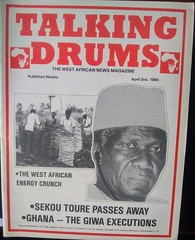Markets Around Africa - Finance For Africa's Priority Industries
Compiled by Ben Mensah
This analysis has helped the CID in identifying EEC companies which may be interested in cooperation with ACP entrepreneurs. Such companies are requested to comply to the following criteria:
Must have produced an ACP priority product for at least 5 years.
Should preferably be small or medium sized, but not one-man operations.
Have an ongoing export to an ACP country.
Be in good financial standing and or have good existing plant that could be relocated as an investment to an ACP country.
Be willing to take a minor share of the equity, in a joint venture with an ACP partner.
The ACP priority industries are the following:
AGGRO-FOOD: Fruit and vege- tables fruit and vegetable canning, fruit juices and jams, fruit and vegetable dehydration, soft drink production, vegetable oil production.
Meat and Livestock - poultry and pig farming, abattoirs, meat processing.
Milk dairy farming, reconstitution of milk from powders, soya milk. Fish fishing operation, cold storage, canning, fishmeal, smoking and drying of fish, fish and shrimp farming, production of fishing boats and equipment.
Flour small-scale flour mills based on rice, sorghum, maize and other local grains, biscuits manufacturing, bakeries.
Miscellaneous - animal feed mills using maize, cassava, fish and vegetable waste, molasses etc, salt refining, production of soap and detergent.
WOOD INDUSTRIES:
Sawmills, general wood workshops, wooden furniture, toys, building elements such as doors, windows, cupboard, and panel boards.
METAL WORKING: General metal workshops, engine reconditioning, agricultural implements, carts, trailers etc, sheet metal tanks, containers, animal feeding equipment etc, and building components such as roofing and hardware.
LEATHER INDUSTRIES
Tanneries, handicrafts, shoes, bags, leather articles.
ENERGY:
Renewable energy e.g. solar collectors and wind generators, combustible briquettes, charcoal.
PAPER, PRINTING:
Cardboard, paper bags, envelopes etc, general printing works for books, stationery and utilization of waste paper.
BUILDING MATERIALS:
Ceramic tiles and sanitary ware, sanitary fittings, water, sewer and irrigation pipes, bricks, panels, tiles, low cost housing.
OTHER:
Glass bottles and containers, household plastic articles.
Meanwhile entrepreneurs in Africa and other ACP countries are invited to take advantage of the Lome Convention which provides the following European offers in finance and technology.
Such entrepreneurs should channel their applications through the Centre for Industrial Development (CID), Brussels giving a short assessment of the viability of their proposed projects and details of the potential market.
OFFER I Ref 84/la: A French company is searching for ACP companies interested in jointly developing an industrial unit for the production under licence of hard wearing non-toxic insecticidal plant. The minimum capacity is around 500 tonnes a year for an estimated investment of US $40,000 excluding buildings and working capital.
The French company is willing to consider any type of cooperation including an equity participation. OFFER 2 Ref 84/2a: A Danish manufacturer is interested in establishing contacts with ACP companies with a view to setting up briquetting plants. The company is prepared to participate financially in joint ventures and to ensure training and technical assistance
The plants on offer include stationary and transportable units which utilize agricultural wastes like straw, sawdust and groundnut shells. Briquettes for use either as fuel or as animal feed can be made with the same equipment.
The minimum capacity of, for instance, a groundnut briquetting plant is 800 kg/h and the cost is US $44,000.
OFFER 3 Ref 84/3a: A French company is interested in setting up a plant to produce mineral water and PVC bottles under a joint venture agreement with an ACP company. The minimum capacity is 1 million bottles a year 1.5 litre size for an estimated investment of US $2 million.
OFFER 4 Ref 84/4a: A Greek particle board manufacturer is willing to undertake feasibility studies, to help with the selection, supply and installation of equipment and to provide managerial and technical assistance. He may also be willing to take an equity participation in an ACP particleboard plant.
Minimum capacity is estimated at 20,000 m³ of particleboard per year, for an investment of US $4 million excluding land and buildings. (Applicants should quote the reference number). Belgian loan to Cameroon Cameroon has received a loan of 750,000,000 CFA francs from the Belgian Government to finance various water projects in the central and south provinces. It is repayable over 20 years. Saudi loan to Guinea Following a visit of a Saudi Development Fund delegation to Guinea a loan agreement was signed on March 11th. The interest of the construction of the 303 km Bikebi-Zerekoure road. A sum of 20,000,000 dollars has been approved for the second phase of this project. Saudi Arabia has lent 39,000,000 rials for the financing of the project.
